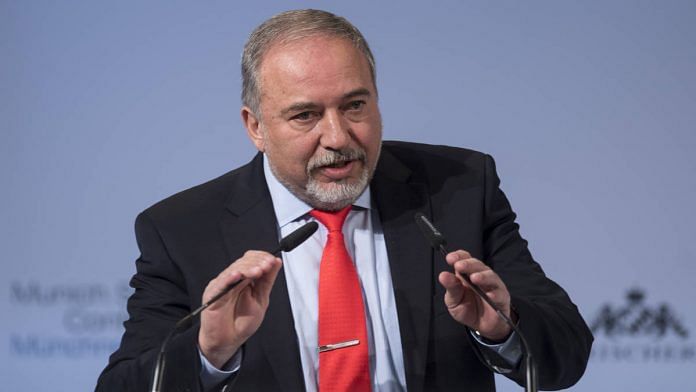New Delhi: With most of the votes counted, the Israeli electorate has again denied Benjamin Netanyahu a clear path to a fifth prime ministerial term, after having delivered a hung verdict in April too.
Netanyahu’s Likud party and the key opposition Blue and White party led by Benny Gantz have both won 32 seats each in the 120-member Knesset, the Israeli parliament. Likud, along with its right-wing and ultra-orthodox allies, has 55 seats, falling six short of the majority mark of 61.
In this political deadlock, Avigdor Lieberman, leader of the Yisrael Beiteinu party, has emerged as the most important kingmaker in recent Israeli history. Once Netanyahu’s closest political manager and his “dirty tricks guy”, Lieberman now has control over nine legislators, and holds the key to prime ministership.
There is a strong sense of déjà vu among Israeli voters and politicians, since it was a similar situation after the April election too. Back then, prolonged coalition negotiations had ended with Lieberman denying support to Netanyahu’s alliance unless he agreed to support a bill which took away the privileges of ultra-orthodox Jews. He had also refused to be part of a government that featured ultra-orthodox parties.
As a result, on 29 May, Netanyahu’s coalition had missed the majority mark by one seat and the Knesset was dissolved — the first time in Israel’s parliamentary history when the single largest party failed to form a government.
Also read: Israel heads into the unknown as Netanyahu’s election gamble fails
Lieberman’s demands
Lieberman is considered the chief reason why Israel was forced to conduct a re-election this year. Now, re-emerging as the kingmaker has further increased his power, Israeli political observers contend.
Following the election result, Lieberman said in a press statement that he would prefer a unity government, including Likud, Blue and White and Yisrael Beiteinu members.
He also laid out his wish-list for any party that now seeks his support. According to a report in the Times of Israel, Lieberman’s demands include “an ultra-orthodox military draft, public transportation and commerce on Shabbat, Haredi secular education and other measures”.
However, Lieberman also seems to have softened his stand on ultra-orthodox parties, saying they were “political rivals, not enemies”.
Netanyahu’s right-hand man
Lieberman, an immigrant from the former Soviet Union, was a part of Likud even before Netanyahu joined mainstream politics. Having joined the party in the early 1980s, he would go on to champion a “secular and right-wing nationalist” stand, and soon became indispensable for Israeli political parties trying to get into power.
Netanyahu finished his tenure as the Ambassador to the United Nations and decided to join the Likud in 1988. Lieberman soon became his “right-hand-man”. As a terrific “grassroots-level organiser”, Lieberman was responsible for facilitating Netanyahu’s rise to the leadership of the Likud in 1993.
“The two soon became inseparable, with Mr Lieberman guiding Mr Netanyahu in and out of weddings, bar mitzvahs and local party offices, always ready with a sandwich or a clean shirt,” noted a report in The New York Times.
Lieberman played a vital role in Netanyahu’s unexpected victory over Shimon Peres in the 1996 elections. “While Netanyahu embarked on fundraising trips to see Jewish millionaires he had befriended during his time as UN ambassador, Lieberman combed Likud headquarters in Tel Aviv, slashing costs and firing dozens of veteran employees,” a Haaretz report on Lieberman said.
Once Netanyahu won the election, he made Lieberman the director-general of his office — effectively the most powerful bureaucrat in Israel.
But eventually, Lieberman developed an image of being Netanyahu’s “dirty tricks” right-hand man, and was seen as a liability by senior Likud members. In 1997, when Lieberman was accused of such, Netanyahu declined to support his closest ally, and Lieberman quit in protest.
Leader of Israel’s ‘most promiscuous’ party
In 1999, Lieberman launched his own political party, Yisrael Beiteinu, which is Hebrew for ‘Israel is our home’.
Since 2001, Yisrael Beiteinu has been a part of the governing coalition on six occasions, with Lieberman holding important portfolios such as foreign and defence under Netanyahu’s premiership.
“Yisrael Beiteinu has been the most promiscuous of Israel’s notoriously disloyal political parties over the past two decades. It has joined and left coalitions at a dizzying rate, always over ‘matters of principle’ that at other times Lieberman had overlooked,” wrote Anshel Pfeffer for Haaretz.
Now, it’s up in the air whether Lieberman once again comes to his former boss’ rescue, or conducts a “coup de grace”, ending Netanyahu’s political career.
Also read: Why Israel will hold fresh elections—Benjamin Netanyahu’s weak leverage in coalition talks



